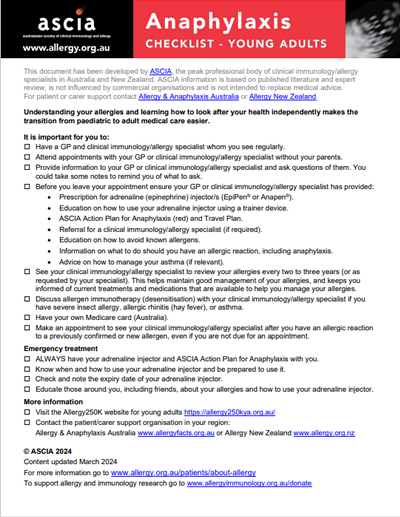Anaphylaxis Checklist - Young Adults (Transitioning from Paediatric to Adult Care)
This document has been developed by ASCIA, the peak professional body of clinical immunology/allergy specialists in Australia and New Zealand. ASCIA information is based on published literature and expert review, is not influenced by commercial organisations and is not intended to replace medical advice. For patient or carer support contact Allergy & Anaphylaxis Australia or Allergy New Zealand.
![]() ASCIA PC Checklist Anaphylaxis Young Adults 202460.27 KB
ASCIA PC Checklist Anaphylaxis Young Adults 202460.27 KB

This checklist may assist young adults with allergies to transition from paediatric to adult medical care
Before you leave the paediatric allergy service:
- Have a GP who you see regularly.
- Have your own health card (such as Medicare card in Australia).
- Try to attend appointments with your GP and clinical immunology/allergy specialist without your parents.
- Provide information about your allergies and health to your GP and clinical immunology/allergy specialist and ask questions. You could take some notes to remind you of what to ask.
- Before you leave your appointment ensure your GP or clinical immunology/allergy specialist has provided:
- Prescription for adrenaline (epinephrine) devices (EpiPen® or Anapen®) if recommended.
- Education on how and when to use your adrenaline device using a trainer device, including correct posture.
- ASCIA Action Plan for Anaphylaxis (red) and Travel Plan.
- Referral for an adult clinical immunology/allergy specialist (if required). Discuss when to see them.
- Education on how to avoid known allergens.
- Information on what to do if you have an allergic reaction, including anaphylaxis.
- Advice on how to manage your asthma (if relevant).
- Information on patient/carer support organisations in your region - Allergy & Anaphylaxis Australia allergyfacts.org.au or Allergy New Zealand www.allergy.org.nz.
- See your clinical immunology/allergy specialist when they suggest, to review your allergies. This helps maintain good management of your allergies, and keeps you informed of current treatments and medications that are available to help you manage your allergies.
- Discuss allergen immunotherapy (desensitisation) with your clinical immunology/allergy specialist if you have severe insect allergy, allergic rhinitis (hay fever) or asthma.
- Make an appointment to see your GP or clinical immunology/allergy specialist after you have an allergic reaction to a new or previously confirmed allergen.
- If you weigh more than 50kg, speak with your doctor about the appropriate dose adrenaline device.
- Visit the Allergy250K website for young adults https://allergy250kya.org.au
Emergency treatment of anaphylaxis:
- If prescribed, ALWAYS carry your two adrenaline devices and ASCIA Action Plan for Anaphylaxis.
- Know when and how to use your adrenaline device and be prepared to use it.
- Regularly check and note the expiry date of your adrenaline devices.
- Educate those around you, including friends, sport teams and workplaces about your allergies and how to use your adrenaline device.
© ASCIA 2024
Content updated August 2024
For more information go to www.allergy.org.au/patients/about-allergy
To support allergy and immunology research go to www.allergyimmunology.org.au/donate
